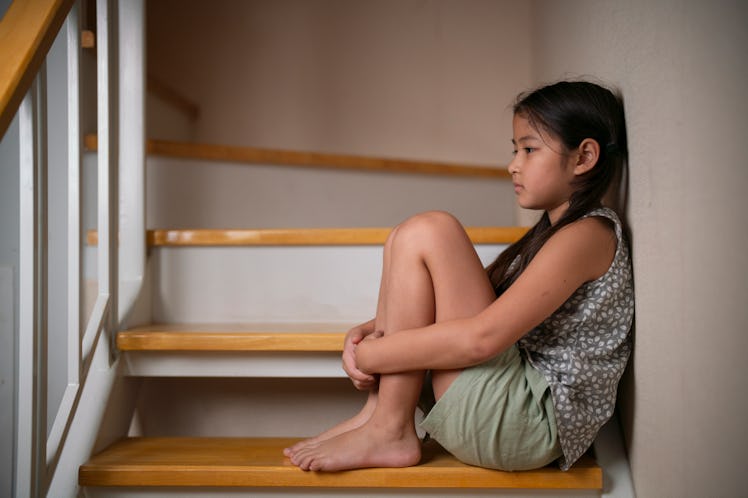The Worst Age For Divorce For Children Is Older Than You Might Think
Babies and teens may be able to weather a divorce, but elementary school children need special care when the family breaks down.

The worst age for divorce for children is essentially any age before adulthood. However, sometimes relationships become so broken that, child or not, there’s no choice but to call it quits. This situation will undoubtedly affect the kid, but children’s reactions to divorce by age is highly variable. That said, experts point to the worst time for a child to experience divorce appears to be when they’re well into elementary school.
According to child psychologist Scott Carroll, M.D., if a divorce happens when a child is a baby, it’s likely that the divorce trauma the child experiences will be nominal. “Probably the only ages where you would say it has no meaningful impact is under 2,” he explains. That’s largely connected to a child’s developing cognitive abilities before 3 years old.
“Even 2-year-olds have memory, so they’re aware of the change on an emotional level rather than a cognitive level. It’s just that an attachment figure is not there,” Carroll says.
What’s the Worst Age for Divorce for Children?
After 3 years old, the potential for emotional trauma appears to peak around age 11. At this point, kids have had a half dozen years of understanding the significance of their parent’s relationship. They’ve developed deep attachments to both parents and the family as a unit. At the same time, they lack independence and are deeply egocentric, which causes them to internalize the family breakdown.
“The divorce itself is not the hardest part,” Carroll explains. “The hardest part is the conflict.”
That conflict becomes particularly damaging if it happens in front of children. Worse still is when parents communicate via the child or tear down their ex-partner.
In the most extreme circumstances, Carroll says, a divorce might even be beneficial. “If there was a lot of conflicts, sometimes the divorce is like a relief.”
How Divorce Affects Older Children
Prior to puberty, divorce trauma can be exacerbated by a parent who simply stops being a parent. A divorce that leads to a lack of contact, or inconsistent visitation, can cause a kid to feel as if they are missing a part of themselves.
“The absolute worst thing for a kid is if, after a divorce, a parent just isn’t involved,” says Carroll. “If you want to see a depressed kid, look at what happens when a parent doesn’t show up” after a divorce has taken place. Again, he explains, this is largely linked to their egocentric tendencies. It’s natural for a kid with an absent parent to wonder, “What’s wrong with me that you don’t love me?”
“Once a child goes through puberty there’s more potential to accept and understand a parent’s divorce,” Carroll explains. “I’ve had teenagers advocate for their parent’s divorce. Sometimes they’re the smartest in the room.”
Resilience in the Face of Divorce
Importantly, Carroll stresses that children are pretty resilient, particularly if they were psychologically healthy prior to the divorce. It might take a year or so to mourn and adjust, but most children do, in fact, adjust to their new reality.
It helps if parents work to keep their conflicts around co-parenting out of sight from their child. It can be difficult, and being successful might require divorce counseling. But parents have to understand the better they can communicate with each other, the better off their kid will be.
“Learn to work together. Because you’re parents. You’ve got to work together,” Carroll says.
This article was originally published on